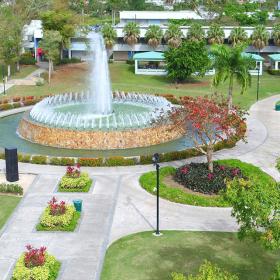School of Veterinary Medicine
Veterinary Medicine
Mission, Vision and Values
The School of Veterinary Medicine of Universidad Ana G. Méndez aims to contribute to excellence in the practice of veterinary medicine in Puerto Rico and the rest of the world by training professional veterinarians equipped with the necessary tools to evaluate, diagnose, and treat animals. Our goal is to continue laying the foundations of the importance of animal care, disease prevention, research, and community education. We will promote the practice of veterinary medicine under strict quality standards and advocate the importance of the global One Health concept.
Advancing animal and human health on the island through exceptional patient care is at the center of our mission. Delivering excellent care will attract the referral base that will help us effectively teach students the art and science of veterinary medicine. Patient care and service to veterinarians are the backbone that will provide us with the environment and resources needed to offer an exceptional teaching program. The completion of the Small and Large Animal Teaching Hospitals construction projects, and the investment in new hospital equipment and materials, will add to our ability to deliver exceptional primary patient care as well as referral services for practicing veterinarians on the island.
About the Program
The Universidad Ana G. Méndez is recognized as an institution focused on academic excellence, research and service, with social responsibility and local and global projection. The Gurabo Campus is an accredited campus of the Universidad Ana G. Méndez, committed to academic excellence, research, innovation, entrepreneurship, internationalization and the socio-humanist development of a diverse population. The Gurabo campus resources support the post-secondary, undergraduate, graduate and continuing education academic offer, through various modalities, framed in the highest quality standards.
The School of Veterinary Medicine (SVM) facilities include: an animal house, multipurpose laboratory, hands-on laboratory, anatomy and pathology laboratory, diagnostic imaging laboratory, research area, clinical pathology laboratory, small animal surgery laboratory, large animal facilities with large animal recovery/ induction surgery suites, a Veterinary Teaching Hospitals (VTH), small and large animal isolation with multiple student services areas and administrative offices. The school will share facilities with the existing university campus to integrate student services, additional research laboratories, the library, and lecture amphitheaters.
Shaiana Negrón-Pagán, DVM
Dean, UAGM School of Veterinary Medicine
snegronp@uagm.edu
Dr. Danny Liswaniso, DVM, MSc, PhD
Associate Dean of Academic Affairs
Professor, Biomedical Sciences
dliswaniso@uagm.edu
Dr. Darryn Knobel, BVSc, MSc, PhD
Associate Dean of Research
Professor, Research
knobeld1@uagm.edu
Dr. Pedro De Pedro, DVM, MSc, Dipl. ACVIM
Associate Dean of Clinical Affairs
Professor, Clinical Sciences
pdepedro@uagm.edu
Dr. Aileen Garced, Ed.D
Associate Dean of Student Affairs
agarced@uagm.edu
Doris M. Castellanos, MBA, MHA, CIP
Associate Dean of DVM and Graduate Programs
Associate Professor, Biomedical Sciences
docastellanos@uagm.edu
Dr. Fred Soltero
Director, Veterinary Teaching Hospital
fsoltero@uagm.edu
Dr. Molly Carpenter, DVM, PhD
Associate Professor, Biomedical Sciences Faculty
mcarpenter@uagm.edu
Dr. Simon Ayo Yila, DVM, MSc, PhD
Associate Professor, Biomedical Sciences Faculty
ayos1@uagm.edu
Dr. Mario Mercado, DVM
Animal House Coordinator
Associate Professor, Biomedical Sciences Faculty
mamercado@uagm.edu
Dr. Agustin Perez, BVSc, MVSc, PhD
Associate Professor, Biomedical Sciences
pereza9@uagm.edu
Brenda M. Norat Serrano
Administrative Assistant
bmnorat@uagm.edu
787-743-7979, x 4063
Ilianex Oquendo Pérez
Coordinator of Integrated Academic Services
ioquendo@uagm.edu
787-743-7979, x 3681
Carina I. Gobaira Muñiz
Admissions Recruitment Advisor
cgobaira@uagm.edu
787-743-7979, x 3497
Juan Cotto Gonzalez
Bursar Advisor
jucotto@uagm.edu
787-743-7979, x 3599
Eugenio Quiñones Cancel
Associate Registrar
euquinones@uagm.edu
787-743-7979, x 6833
Edwin Lloret
Enrollment Officer
edlloret@uagm.edu
787-743-7979, x 3604
José Caraballo
Financial Aid Advisor
joscaraballo@uagm.edu
787-743-7979, x 3729
“In compliance with AVMA-COE requirements, UAGM will include the current status granted by AVMA-COE on December 15, 2023 (notified to UAGM on January 11, 2024), using the verbatim text below:"
AVMA granted UAGM Gurabo Campus, Doctor of Veterinary Medicine program a Letter of Reasonable Assurance – This is a status awarded to developing colleges in the US and Canada. This recognition allows the College to pursue its plan for the veterinary program, and to admit students. Reasonable Assurance is not a pre-accreditation action, by the Council, and does not confer accreditation of any kind on a developing college.
The Letter of Reasonable Assurance is the first step in the process of obtaining the AVMA COE accreditation. At this time, the program is authorized by AVMA COE to admit the first class. If a college granted Reasonable Assurance is making adequate progress in complying with the Standards, Provisional Accreditation may be granted to that college on the date that letters of acceptance (admission) are mailed to members of the initial class. Colleges with a status of Reasonable Assurance or Provisional Accreditation are required to submit reports at six-month intervals to monitor the program’s progress in complying with the Standards according to colleges-accredited-Dec-23.pdf (avma.org). Students who graduate under the Provisional Accreditation status are eligible to sit for the North America Veterinary Licensing Examination (NAVLE) to practice in the American territory.”
Education
Curriculum and Clinical Training
The School of Veterinary Medicine, Doctor of Veterinary Medicine curriculum is comprised of a 4-year course of study with the final year dedicated to applied learning through clinical core and elective rotations and externships.
The first year is devoted to the building of strong basic sciences foundation courses such as basic principles of anatomy, physiology, research, cellular structure, and molecular science virology, bacteriology, and mycology along with skills in physical examination, clinical reasoning, and ethics and business management.
The second year focuses on core courses covering normal physiological principles in health and disease and integrates material from the first year. Courses include pathology, pharmacology, toxicology, nutrition, the principles of surgery, internal medicine, anesthesia, and diagnostic imaging, as well as clinical pathology. During this year, students will have the opportunity to rotate in the VTH as part of their introduction to clinical training.
Third year courses enhance clinical skills training and professional development while expanding on experiential learning and integration of the content into principles of clinical practice. These courses include veterinary dentistry, SA internal medicine and surgery, LA internal medicine, theriogenology, LA surgery, farm animal medicine and Licensing Examination course. During this year, students will have the opportunity to rotate in the VTH.
Fourth year students will enroll in their clinical rotations to put into practice the veterinary concepts and skills acquired during the pre-clinical years.
Electives - The curriculum provides a variety of content and supplemental topics not taught in the core curriculum. These incorporate applied and experiential learning, allowing students to develop areas of their professional interest.
Courses
Clinical Year
The clinical year program will consist of 48 weeks rotations, with a total of 48 credits, encompassing 12 rotations of 2 weeks duration each semester. Students will take a 2-week mid-rotation break to have the opportunity to participate in clinical externships. The VTH will serve as the main resource for pre-clinical and clinical rotation experiences. Students will be exposed to diverse clinical scenarios, such as wellness examinations and emergencies to enhance their communication skills through student-client interactions in exam rooms with post-interaction evaluations by SVM specialty teaching faculty. Students will also experience patient handling and history taking, as well as participating in the clinician’s approach to the patients’ individual case, during the diagnosis, treatment recommendations, and discharge instructions to the owners, with the support of experience clinical faculty.
Currently, UAGM SVM has established communication with AVMA accredited schools and colleges of Veterinary Medicine in the United States which have expressed interest in hosting UAGM SVM senior students for their clinical rotations. Furthermore, UAGM SVM has secured partnerships with clinical specialty centers. These efforts will give our students the necessary exposure to a diverse caseload that includes both healthy and diseased animals from various domestic and exotic species, either as clinical patients or teaching animals.
The UAGM School of Veterinary Medicine will offer a new range of graduate programs and professional certificate opportunities. These innovative academic opportunities are designed to complement veterinary training with advanced knowledge in research, public health, practice management, and environmental science. DVM and non DVM students will have the opportunity to pursue integrated graduate degrees and professional certificates in areas critical to veterinary medicine.
DVM/PhD in Environmental Sciences
The DVM/PhD in Environmental Sciences will be an interdisciplinary program for students who are passionate about environmental research and One Health Systems approach to solutions. The dual Degree will be offered in partnership with the PhD in Environmental Sciences program at Universidad Ana G. Méndez (UAGM). The dual degree program will combine advanced veterinary training with scientific research focused on climate change, toxicology, water quality, ecosystem health, and sustainability.
MSc in Veterinary Science
The Master of Science in Veterinary Science degree will prepare students with critical thinking skills needed to thrive in career paths such as research and specialized veterinary clinical practice. With a focus on research design, data analysis, and laboratory services or field-based investigation, this program will prepare students for research careers or advanced specialization. Furthermore, an MSc in Veterinary Science will provide practicing veterinarians the skills needed to become highly trained in a specific veterinary field and support their professional growth in veterinary medicine. DVM students will have the opportunity to pursue an MSc alongside their veterinary medicine training, building a strong foundation for specialization or future doctoral studies.
Professional Certificate in One Health
The Professional Certificate in One Health will teach students the core concepts of One Health and the driving forces for its emergence. Students will be able to evaluate the principles of One Health to generate new interventions and strategies to address contemporary global health challenges. Additionally, students who complete the certificate will recognize the complexity of One Health with a clear understanding of the vital role of multidisciplinary collaborations, networks and teams in implementing One Health system approaches to address animal, environmental and human health issues.
Professional Certificate in Veterinary Practice Management
The Professional Certificate in Veterinary Practice Management will equip veterinary professionals and students with the essential skills needed to effectively lead, manage and grow fast-paced veterinary practices and stand out in the world of veterinary business and industry operations. Students will be able to apply core principles of business management within a veterinary context, including finance, business operations, human resources, leadership, strategic planning, marketing and compliance. Students who complete the certificate will enhance their professional career in veterinary practice management.
We invite students currently planning their DVM path, those already enrolled and professionals in the veterinary medicine field, to explore how these options can support their long-term career goals. Stay tuned for more information on admissions, curriculum design, and application timelines.
Departments
Biomedical Sciences
The Department of Biomedical Sciences is an academic department that focuses on the study of biological systems and processes as they relate to veterinary health and disease. It typically includes faculty and researchers with expertise
Clinical Sciences - Small Animal Clinical Sciences
The Small Animal Clinical Sciences focuses on the study of the health and well-being of small animals, typically including dogs, cats, rabbits, guinea pigs, hamsters, and other small mammals. It comprises of faculty and researchers with expertise in areas such as animal behavior, medicine, nutrition, pharmacology, infectious diseases, and surgery.
Clinical Sciences- Large Animal Clinical Sciences
The Large Animal Sciences focuses on the study of the health and well-being of large animals, typically including horses, cattle, pigs, sheep, goats, and other livestock species. It typically includes faculty and researchers with expertise in areas such as animal behavior, nutrition, epidemiology, infectious diseases, and surgery. The department advances our understanding of the biology and care of large animals, and to develop new approaches to improve their health and welfare.
Admissions
Complete and apply through VMCAS. (to be admitted each August)
- Each January the VMCAS application cycle opens.
- From May to September, each year, you can select the UAGM School of Veterinary Medicine as your school of preference and finish completing your application.
Requirements:
• Bachelor’s degree in a field related to the program from an accredited institution
Required**:
| - Two semesters of General Biology (6 credits) - One semester of General Microbiology and laboratory (4 credits) - One semester of Genetics (3 credits) - General Chemistry and laboratory (4 credits) - General Organic Chemistry and laboratory (4 credits) |
- One semester of Biochemistry (3 credits) - One semester of General Physics (3 credits) - One semester of any of the following: Pre-calculus, Calculus, Statistics (3 credits) - Two semesters of English (6 credits) - One semester of Humanities or Social Sciences (3 credits) Recommended - One semester of Animal Nutrition (3 credits) |
• A minimum letter grade of C is required in all the required courses.**
• A minimum GPA of 3.00
• Submit an official transcript directly through VMCAS
Standardized Tests (CasPer, TOEFL)
• CasPer test scores-
- All applicants are required to complete CASPer as part of their application for each admissions cycle.” (ensures consistent and correct capitalization of the CASPer test name). Remember to add UAGM as a score recipient.
• Provide proof of English competency if English is not your first language
- TOEFL or IELTS
TOEFL:
- Universidad Ana G. Méndez- Gurabo Campus
- DI Code: D667
- Location: Gurabo, Puerto Rico
Experience
• Complete the equivalent of a minimum of 300 hours of veterinary professional experience
- Hands-on experience and/or related areas research experience
Rabies Vaccine
• Submit evidence of Immunization against rabies*- (students have the option to waive until they receive an admission letter). Use the following link to submit vaccine evidence:
https://estocit.uagm.edu/uagm/veterinaria/
Note: The rabies vaccination certificate or card will be considered invalid if it is damaged, altered, folded, crossed out, or if the photograph/scan is blurry. The image must show only the certificate or card—nothing else should be visible (no hands, tables, or other objects).
Normative of Immunization Against Rabies :
Evidence may also be submitted through VMCAS.
* If vaccine is administered after the VMCAS cycle closes you may send it to ioquendo@uagm.edu or vetmedadmin@uagm.edu.
Letters of Recommendation (LOR)
• Submit 3 letters of recommendation
- One must be written by a veterinarian; the others may be written by professors or researchers.
- Please note that the professors, veterinarians, or other professionals must submit the letters of recommendation directly through VMCAS.
Application Fee
• Submit a $100.00 non-refundable application fee through the following link (also available on VMCAS): https://athom.uagm.edu/pagos/?Codigodetalle=GDVM
• Once the application is received through VMCAS and evaluated, the student will be a candidate for a personal interview with the Admissions Committee.
* Applications will be evaluated by the admissions committee once the payment is completed.
Students interested in applying for the UAGM SVM DVM program starting in August 2025 must complete the application process and submit all required documents through the Veterinary Medical College Application Service (VMCAS).
Students who wish to be admitted to the Doctor of Veterinary Medicine program should apply through VMCAS during the application window (January–September) for enrollment beginning in August 2025.
Students interested in beginning the DVM program in August 2026 must complete the application process and submit all required documents through the School of Veterinary Medicine admissions portal.
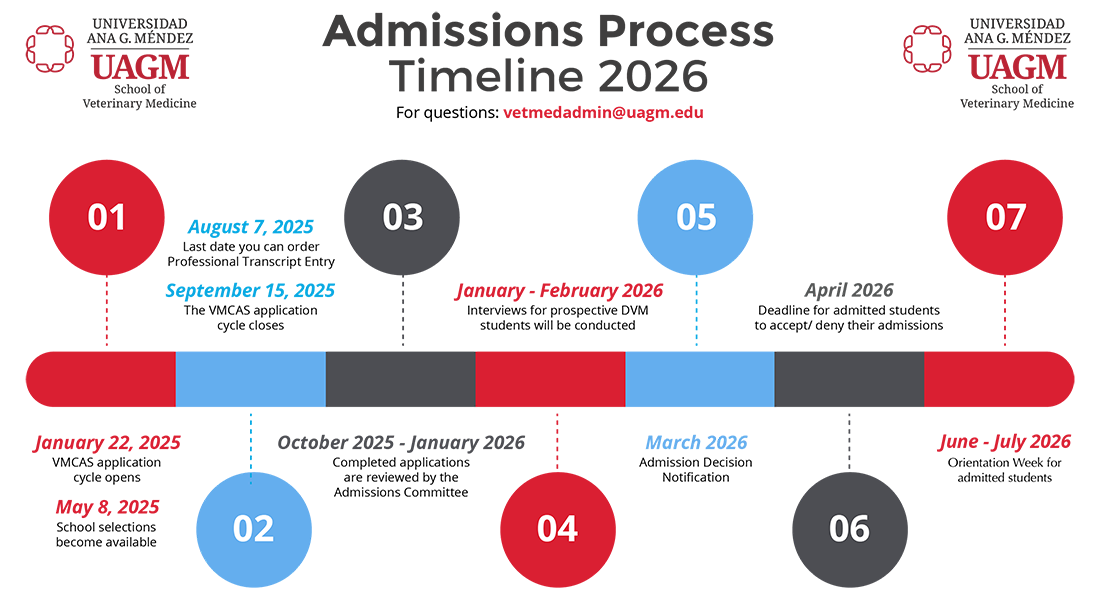
Click here to view the cost of attendance for the Doctor of Veterinary Medicine Program.
Since UAGM is a Title IV Program participant, the SVM DVM eligible students will have access to federal financial aid. The Student Financing Advisor under the Associate Deanship of Student Affairs in collaboration with the Financial Aid Office, are the units responsible to provide orientation, support, and financial services to the SVM DVM students.
Students
Library services
The UAGM Library will ensure that SVM DVM students, faculty, and staff have adequate access to library services and learning resources — including e-books, electronic journals, databases, and veterinary collections — supported by individual orientation sessions and workshops.
Other Services and Schedule:
Service hours In-person
- Monday-Thursday: 7:00 a.m. – 8:00 p.m.
- Friday: 7:00 a.m. – 5:00 p.m.
- Saturday: 8:00 a.m. – 5:00 p.m.
Summer Schedule
- Monday thru Friday 7:00 am - 5:00 pm
- Saturday, Sunday and Holidays: Closed
Quality of Life's main objective is to provide support services for the diverse situations that UAGM students may face. Our purpose is to promote healthy lifestyles so that students achieve their academic, personal, social, and professional success.
Student Services
- Counseling:
- Personal
- Occupational
- Academic
- Program for Students with Disabilities
- Social Work
- Psychological Services
- Medical Services
- Taino Oasis
Contacts
- Dra. Gloria Rosario
Director
Ext. 3533
rosariog2@uagm.edu
- Lic. Patricia Morales
Professional Counselor
Ext. 3844
patmorales@uagm.edu
- Dr. Edward Fankhanel
Psychologist
Ext. 3537
fankhanel@uagm.edu
- Luz Berríos - BSN
Ext. 3553
leberrios@uagm.edu
- Dr. Jaime Nadal Bosch
General Medicine Doctor
Ext. 3553
jnadal@uagm.edu
List of registered and recognized student clubs for the DVM program
- SCAVMA
- VBMA
- One Health Club
- ACVIM Student Club
- AABP Student Club
- AAV Student Club
- AAVP Student Club
- AAEP Student Club
- ASLAP Student Club
- SCAVSAB Club
- SCACVP Club
List of registered and recognized student clubs for Veterinary Technology Program
- NAVTA Student Club
SAVMA UAGM
What is SAVMA?
The Student American Veterinary Medical Association (SAVMA) was created in 1969 as the national organization for veterinary students, in order to foster communication between individual chapters. Currently, SAVMA is comprised of 40 student chapters (34 in the U.S., 1 in Canada, 2 in the Caribbean, and 3 in the United Kingdom) and one associate organization, representing a total of over 20,000 veterinary student members.
SAVMA's mission is to support, empower, and inspire all veterinary students in improving their lives, education and career, along with securing a better future for our profession through collaboration with our parent organization, the American Veterinary Medical Association (AVMA).
SAVMA UAGM is the local chapter of SAVMA, the Student Association of the AVMA. SAVMA is composed of 28 chapters and represents us in the AVMA House of Delegates.
Click here to view UAGM SVM SAVMA Chapter By laws.
Join SAVMA today!
How SAVMA Benefits Students
A unified student voice is important in veterinary medicine and is provided by SAVMA on national issues such as government and education. Each year, approximately 2,000 veterinary students gather for three days at the SAVMA Symposium to meet fellow student colleagues, attend various lectures and wet labs, to network with practitioners and veterinary related corporations, and to compete academically and athletically.
Our UAGM Student Chapter has an executive board. The board meets regularly to discuss issues or events that are upcoming and important to our student body.
Meet SAVMA UAGM Executive Board!
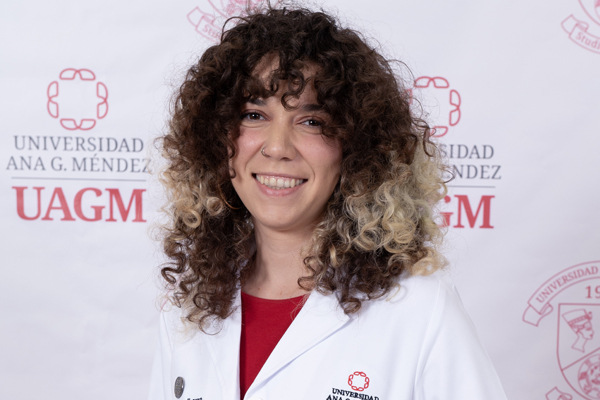
Alondra D. Ramos Ibarra
President
aramos619@email.uagm.edu
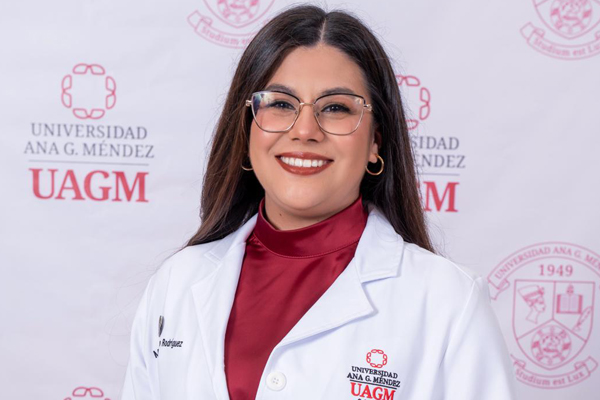
Mariana Cabán Rodríguez
Jr. Delegate
mcaban40@email.uagm.edu
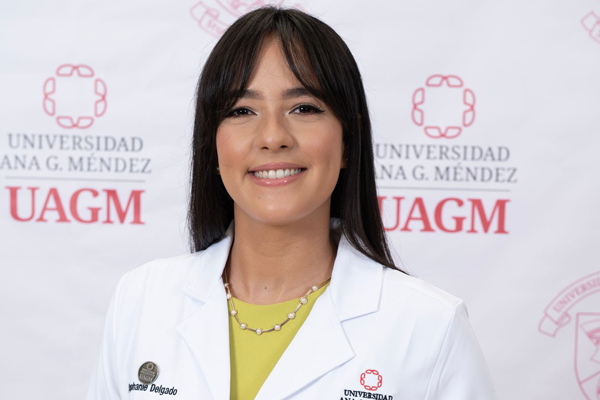
Stephanie M. Delgado Dávila
Secretary
sdelgado114@email.uagm.edu
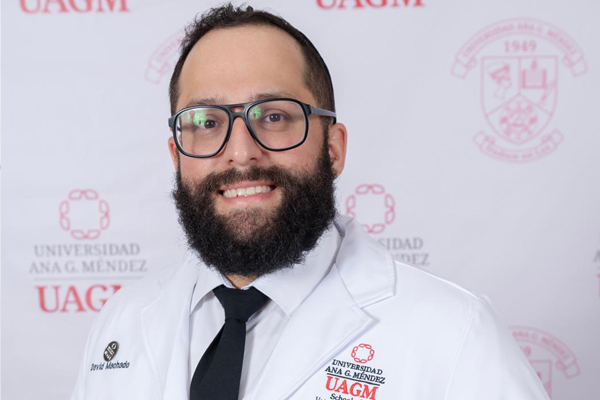
David Machado
Treasurer
dmachado8@email.uagm.edu
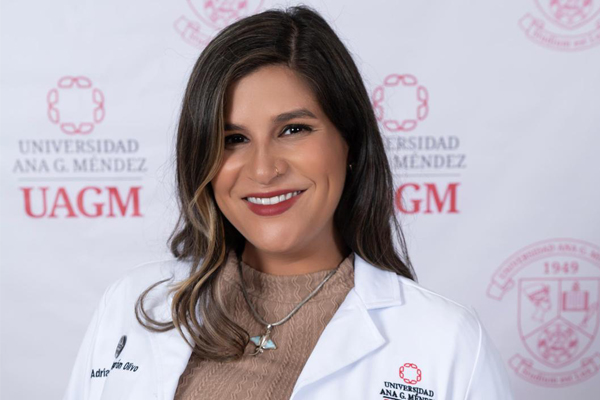
Adriana Negrón Olivo
Class Representative 2028
anegron220@email.uagm.edu
Career planning is essential for student success in veterinary medicine. Planning for the future can be stressful and overwhelming, but the Student Affairs career and advising team will support the Doctor of Veterinary Medicine and Veterinary Technology programs.
Events
- 1st Annual Adoption Fair
- Orientation day
Research News
Boehringer Ingelheim Veterinary Scholars Program
- Jaylene Figueroa, ‘Surveillance of Culicoides vectors of livestock orbiviral diseases in Puerto Rico’ (Mentor: Dr. Molly Carpenter)
- Isabel Rodríguez Acosta, ‘RNAscope® 4-plex assay in bluetongue virus coinfected Culicoides sonorensis’ (Mentor: Dr. Molly Carpenter)
Morris Animal Foundation Veterinary Student Scholar program grant
- Francisco J. Benítez Merle, ‘Optimization of non-invasive methods for canine saliva collection’ (Mentor: Dr Darryn Knobel)
Foundation for Food Animal Research Veterinary Student Research Fellowship
- Francisco J. Benítez Merle, ‘Assessing pasture and soil health under rotational grazing: A pilot study at Finca Pastoreo, Puerto Rico’ (Mentor: Dr Darryn Knobel
Send an Email to yourvoicecounts_veterinary@uagm.edu to share your opinion.
Research
At UAGM School of Veterinary Medicine, the goal of the research program is to create opportunities to strengthen student and faculty engagement with research to improve animal health in Puerto Rico and beyond. We are committed to fostering and supporting a culture of scientific inquiry among students and faculty. Our Doctor of Veterinary Medicine (DVM) students receive training in the principles, application, and ethics of research methods and in the appraisal and integration of research into veterinary medicine and animal health through foundational courses in their first year. Students with a particular interest in research can further pursue this through elective courses and summer programs, which afford students the opportunity to be introduced to various research experiences ranging from involvement in an approved research project on campus alongside a research faculty mentor, to working several weeks or months at another institution, program or field investigation.
Research Focus Areas
The broad thematic area of research that has been identified at UAGM SVM is Vector-Borne Infectious Diseases in the Caribbean Basin and Gulf of America (Gulf of Mexico). This theme builds on current faculty expertise in the school and leverages Puerto Rico’s unique geo-political situation as a nexus between the US mainland and the tropical Caribbean region, providing opportunity for research programs on vector-borne disease threats to animal and human health in Puerto Rico and mainland US. Research programs under development include the following focus areas: (i) volant (flying) invertebrate vectors (primarily mosquitoes and midges and vector-borne diseases, including dengue, Zika, chikungunya, Oropouche fever and Venezuelan equine encephalitis), (ii) nonvolant invertebrate vectors (primarily ticks and tick-borne disease, including babesiosis, anaplasmosis, heartwater, equine piroplasmosis and African swine fever), (iii) volant vertebrate vectors (primarily bats and bat-borne diseases, including lyssaviruses and novel coronavirus species), and (iv) nonvolant vertebrate vectors (primarily rodents and rodent-borne diseases such as leptospirosis, as well as small Indian mongooses as vectors of rabies virus in Puerto Rico). Cross-cutting disciplinary focus areas within these programs will include epidemiology and surveillance, vector and host population dynamics, and host-pathogen-vector interactions.
Veterinary Summer Scholars Program
Application for the 2025 program is closed. The application for the 2026 program will open in Spring 2026.
This program provides DVM students with an opportunity to gain experience in biomedical research by completing an 8-week research project under the guidance of a faculty mentor and presenting their findings at the National Veterinary Scholars Symposium. The symposium brings together veterinary scholars and leading researchers from academia, government, and private research sectors. Students benefit from close mentorship and collaboration with university faculty throughout the program. The program provides successful applicants with a stipend for the period of the research and covers research-related travel costs.
Boehringer Ingelheim Veterinary Scholars Program
The School of Veterinary Medicine at Universidad Ana G. Méndez has been awarded a grant through the Boehringer Ingelheim Veterinary Scholars Program. This program provides DVM students with an opportunity to gain experience in biomedical research by completing an 8-week research project under the guidance of a faculty mentor and presenting their findings at the National Veterinary Scholars Symposium. The symposium brings together veterinary scholars and leading researchers from academia, government, and private research sectors. Students benefit from close mentorship and collaboration with university faculty throughout the program. The program provides successful applicants with a stipend for the period of the research and covers research-related travel costs.
Deadline for Applications
- February 17, 2025
Eligibility Requirements
- Students must have completed at least one year of the veterinary curriculum by May of the program year and be in good academic standing.
- Veterinary students in their first or second year of veterinary school are encouraged to apply.
- Universidad Ana G. Mendez students will engage in research activities during the summer term (June/July).
- For more information on how to apply, please email the Associate Dean for Research Dr Darryn Knobel: knobeld1@uagm.edu
Resources
For more information about the program, visit the Boehringer Ingelheim Veterinary Scholars Program website.
Student Ambassador Program
Ambassador Programs are a great opportunity for students. Some of the ambassador programs students can be part of are:
Banfield Pet Hospital
Thrive Pet
Dechra
Veterinary Teaching Hospital
Advancing animal and human health on the island through exceptional patient care is at the center of our mission. Delivering excellent care will attract the referral base that will help us to effectively teach students the art and science and medicine in the veterinary field. Patient care and service to veterinarians is the backbone which will allow us the environment and resources to provide an exceptional teaching program.
The Veterinary Teaching Hospital is designed to provide primary teaching clinical scenarios for students, following the best clinical practice standards under the supervision of their professors and the veterinary clinical staff for small and large animals. The hospital will serve the community as a general and referral practice. The facilities will include: reception areas for client and patient receiving, the hospital business office, Specialty Services treatment areas – that allow for specialist such as Internal Medicine, Medical Oncology, Surgery, Anesthesia, Cardiology, Neurology, Dentistry, Radiology, Theriogenology and Ambulatory, Primary Outpatient care (each area includes shared day holding, vet tech offices and rounds rooms), Emergency / ICU / Intermediate Care, Isolation, Pharmacy, small animal wards (including diet prep, food storage, housekeeping storage, and laundry), large animal holding and treatment areas, diagnostic imaging, clinical pathology, and paddocks.
Pathology and Diagnostic Laboratory
Veterinary Medicine FAQs
Complete the application process and document submission through the VMCAS portal.
Please contact the Vice Chancellor and Associate for Quality of Life and Student Wellbeing office to clarify all questions.
